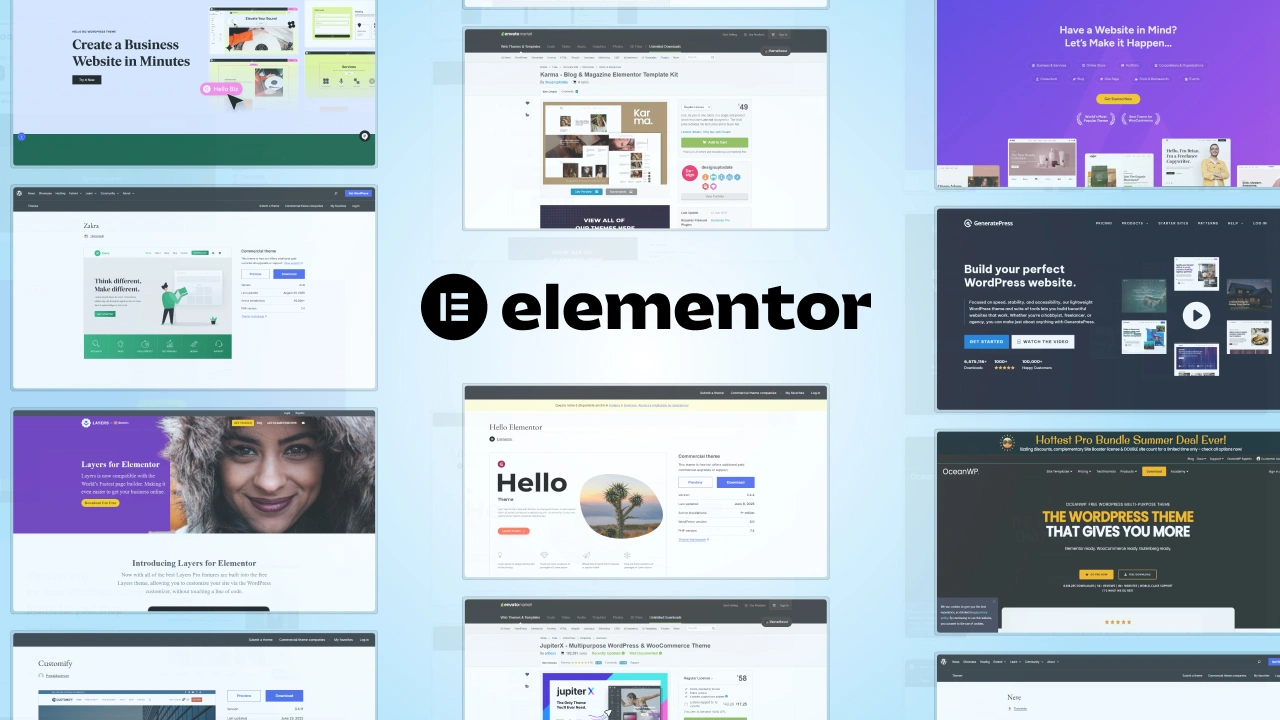Thinking about using WordPress or Wix for your website? That’s a decision a lot of people are trying to make right now.
They’re both popular tools, but they work very differently.
Wix is simple. You sign up, choose a template, drag things around, and hit publish.
WordPress gives you more freedom, but it takes more work. You’ll need to sort out hosting, plugins, themes — the whole setup.
In this guide, we’re putting them head to head. No fluff, no “it depends” answers.
Each section will have a clear winner, so by the end, you’ll know which one makes more sense for you.
Let’s get into it.
⏰ 60-Second Summary
- Wix is easier for beginners, with drag-and-drop editing, built-in tools, and simple pricing — great for launching a site quickly without technical skills.
- WordPress offers more flexibility and control, making it ideal for blogs, advanced websites, and scalable store setups using plugins like WooCommerce.
- Wix handles website security for you, while WordPress site owners need to manage it themselves using security plugins and regular updates.
- WordPress plugins let you customize almost anything, but setup takes more time; Wix includes most features out of the box, with fewer configuration needs.
- If you want full design freedom, long-term growth potential, and powerful tools for search engine optimization, WordPress is the better choice — but Wix is great if you just want something that works fast.
WordPress vs. Wix: A Side-by-Side Comparison
| Feature | Wix | WordPress | Wix Rating | WordPress Rating |
|---|---|---|---|---|
| Ease of Use | Very easy, drag-and-drop builder | Takes time to learn, more setup needed | ⭐⭐⭐⭐⭐ | ⭐⭐⭐ |
| Design Flexibility | Good templates, but not flexible after choosing | Highly flexible, full control with code | ⭐⭐⭐⭐ | ⭐⭐⭐⭐⭐ |
| Pricing | Monthly plans with everything included | Free software, but pay for hosting, themes, plugins | ⭐⭐⭐⭐ | ⭐⭐⭐⭐ |
| Built-in Features | Lots of built-in tools out of the box | Depends on plugins you install | ⭐⭐⭐⭐ | ⭐⭐⭐ |
| Customization | Limited to what Wix allows | Fully customizable with themes, plugins, and code | ⭐⭐⭐ | ⭐⭐⭐⭐⭐ |
| eCommerce | Great for small stores | Best for large, scalable stores (WooCommerce) | ⭐⭐⭐⭐ | ⭐⭐⭐⭐⭐ |
| SEO | Basic SEO tools built-in | Advanced SEO with plugins like Yoast | ⭐⭐⭐ | ⭐⭐⭐⭐ |
| Support | 24/7 customer support | Community support, or pay for premium help | ⭐⭐⭐⭐ | ⭐⭐⭐ |
| Scalability | Not ideal for complex or large sites | Can scale to almost anything | ⭐⭐ | ⭐⭐⭐⭐⭐ |
Sometimes, all you need is a quick chat with someone who’s done this a hundred times.
Overview of WordPress & Wix
In the competition of Wix vs. WordPress, both website builders are solid tools, but they’re built for different kinds of users.
If you want something quick, easy, and all-in-one — Wix is the better choice. It’s beginner-friendly, comes with built-in features, and you don’t need to touch any code. You can have a nice-looking website up and running in an hour.
On the other hand, if you care about flexibility, customization, and long-term growth — WordPress is the way to go. It takes more effort to get started, but you can build just about anything with it. You control how your site works, looks, and scales.
Here’s the short version:
- Go with Wix if you want simplicity and speed.
- Go with WordPress if you want full control and room to grow.
The rest of this guide breaks it all down, category by category — and we’ll call a clear winner in each one.
Ease of Use: Wix Wins for Beginners
If you’ve never built a website before, the idea of setting one up can feel overwhelming. That’s where Wix really shines. It’s built for beginners — no coding, no complex setup, no stress.
From the moment you create an account, Wix guides you through the process step by step. You can choose a ready-made template or use Wix ADI (Artificial Design Intelligence), which asks you a few questions about your site and then builds it for you. It’s fast, and honestly, it’s kind of fun.
The editor is visual and super intuitive — just click, drag, and drop elements wherever you want. You can see exactly what your site will look like as you build it. There’s no need to worry about hosting, domains, updates, or security — it’s all handled for you behind the scenes.
Now, compare that to WordPress.
WordPress gives you a lot more freedom, but it also puts more responsibility on your shoulders. You’ll need to:
- Choose and pay for a hosting provider
- Install WordPress manually (or use a one-click install if your host offers it)
- Pick a WordPress theme and customize it
- Install and configure plugins for features like SEO, contact forms, security, and backups
It’s not hard, but it definitely takes more time — and if you’ve never done it before, it can feel like a lot. There’s also no official support team, so you’ll be Googling your way through most problems (or paying someone to help).
If you’re tech-savvy or don’t mind learning as you go, WordPress is manageable. But if you just want a clean site up and running fast — without learning curves or tutorials — Wix makes the process way easier.
So whether you’re setting up a personal blog, a simple online store, or experimenting with a new blogging platform, Wix helps you get started without all the setup work that comes with WordPress.
Design Flexibility: WordPress Takes the Crown
Wix gives you a really solid starting point when it comes to design. You get access to over 900 pre-built templates, all sorted by industry and purpose — portfolios, business sites, restaurants, online stores, and more. The templates are well-designed, mobile-responsive, and look modern right out of the box.
And editing them is easy. With Wix’s drag-and-drop builder, you don’t need to know a thing about design or code. You can move elements around, change fonts and colors, add images and video — and you see all the changes in real time.
But there are limits.
Once you pick a template, you’re locked into that structure. If you want to switch to another one later, you’ll have to start your design over from scratch. This can be a major pain if you decide you want a completely different layout or look six months down the road.
Also, while Wix gives you creative freedom within its editor, you’re still working inside a framework that’s built to be simple. You can’t just jump into the code or drastically change how things work. Again, if you have a very specific vision for your website — or need to build something outside the box — Wix might feel restrictive over time.
With WordPress, design flexibility is on another level. There are thousands of themes available — from free ones in the official WordPress theme directory to premium options from third-party developers. You’re not limited to a fixed layout, and you can change your theme at any time without losing your content.
Want to completely customize how a page looks? Use a page builder plugin like Elementor or Gutenberg. Want to go even deeper? You (or a developer) can edit the CSS, HTML, and PHP to make everything look and behave exactly how you want. This is a big deal if you’re building something like a portfolio, a creative business site, or anything with a unique visual style.
And for those who want access to more advanced features — like dynamic content, custom fields, or interactive layouts — WordPress makes it all possible. It’s a platform that scales with your creativity and your needs.
If you’re happy using a beautiful, ready-made template with some customization, a Wix site is great. But if you want true creative control — and the ability to design and redesign freely — WordPress is the clear winner.
Pricing: WordPress Edges Out
When it comes to pricing, Wix is super straightforward. You choose a monthly or yearly plan, and everything you need is included — hosting, templates, support, and even a free domain name for the first year on most premium plans. It’s a convenient, all-in-one package, especially if you don’t want to deal with the technical side of things.
| Feature | Business Elite | Business | Core | Light |
|---|---|---|---|---|
| Price | $159 per month | $36 per month | $29 per month | $17 per month |
| Free Domain | Free domain for 1 year | Free domain for 1 year | Free domain for 1 year | Free domain for 1 year |
| Storage | Unlimited storage space | 100 GB storage space | 50 GB storage space | 2 GB storage space |
| Hosting | Multi-cloud hosting | Multi-cloud hosting | Multi-cloud hosting | Multi-cloud hosting |
| Marketing Suite | Advanced marketing suite | Standard marketing suite | Basic marketing suite | Light marketing suite |
| Payments | Accept payments | Accept payments | Accept payments | Accept payments |
| eCommerce | Advanced eCommerce | Standard eCommerce | Basic eCommerce | No eCommerce |
| Site Collaborators | 100 site collaborators | 10 site collaborators | 5 site collaborators | 2 site collaborators |
Wix’s plans range in price depending on what kind of site you’re building. If you’re running a personal site or portfolio, the lower-tier plans are usually enough. But if you need eCommerce features or want to remove Wix branding, you’ll need to upgrade to one of the Business or eCommerce plans, which can get a bit pricey over time.
WordPress website builder, on the other hand, works a little differently. The software itself is free to download and use — but you’ll still have some essential costs. You’ll need to pay for web hosting (which can start as low as a few dollars a month), register a domain, and possibly invest in a premium theme or plugin depending on your needs. There’s no bundled pricing, but that gives you more flexibility and control over what you’re actually paying for.
| Feature | Personal | Premium | Business | Commerce | Enterprise |
|---|---|---|---|---|---|
| Price | $4 per month | $8 per month | $25 per month | $45 per month | Starting at $25,000/year |
| Storage | 6 GB | 13 GB | 50 GB | 50 GB | Custom Storage |
| Website Features | Custom domain name | Powerful design tools | Managed hosting by WordPress experts | Built-in premium WooCommerce extensions | Unmatched scalability, security, and data-driven capabilities |
You can also use a custom domain from any domain registrar — like Namecheap, GoDaddy, or Google Domains — and connect it to your WordPress site with no restrictions. This means you can shop for better deals or stick with a registrar you already trust.
One thing to keep in mind: Wix displays ads on your site unless you’re on a paid plan. This can affect how professional your site looks — and possibly even turn off website visitors. WordPress, by contrast, gives you a clean slate. As long as you’re self-hosting, your site is ad-free unless you decide to add ads for monetization.
Over time, WordPress tends to be the more cost-effective choice — especially if you plan to grow your site, try out different tools, or scale your content. Wix is great for simplicity and predictable billing, but WordPress gives you more room to adjust your setup based on your budget and goals.
Website Security: Tie
Security might not be the most exciting part of building a website, but it’s one of the most important — especially if you’re collecting data, running a store, or building a site that gets steady traffic.
Wix takes care of everything for you. Since it’s a fully hosted platform, all kinds of security is managed on the backend. That means:
- Automatic SSL certificates
- Regular updates and patches
- DDoS protection
- Server-side security managed by Wix’s infrastructure team
You don’t have to install anything, configure settings, or even think about security — it’s built in. This is ideal for beginners or anyone who just wants peace of mind without dealing with technical stuff.
With WordPress, you’re in charge of securing your site — especially if you’re self-hosting (which most WordPress users do). The good news? There are tons of tools available. The not-so-good news? You’ll need to take some action.
To protect your WordPress site, you’ll want to:
- Install a WordPress security plugin (like Wordfence, Sucuri, or iThemes Security)
- Keep your core WordPress version, themes, and WordPress plugins up to date
- Use strong passwords and limit login attempts
- Set up automatic backups (via a plugin or your hosting provider)
- Choose a reliable web host that provides basic security features
For WordPress site owners who are tech-savvy or willing to learn, this level of control is a big plus. You can fine-tune every aspect of your site’s protection. But if you’re not comfortable managing updates or configuring plugins, you might prefer the simpler, done-for-you approach Wix offers.
Built-in Features: Wix Dominates Out-of-the-Box
If you’re the kind of person who wants everything ready to go right away, Wix has a major advantage here. When you create a Wix account, you’re not just getting a website — you’re getting a full toolkit.
A Wix website comes preloaded with most of the features everyday users need. You get built-in SEO tools, contact forms, image galleries, blog functionality, video backgrounds, social sharing, appointment scheduling, and even eCommerce options — all without installing anything extra.
Want to accept bookings for your business? It’s built in. Need to connect to your Instagram feed? A few clicks. Selling products? The eCommerce tools are ready to go. Wix even has a logo maker and email marketing features baked right into the platform. You don’t have to worry about compatibility issues or updates — it’s all handled for you behind the scenes.
WordPress takes a more do-it-yourself approach.
The WordPress core software is lightweight by design, which means it doesn’t come with all the extras out of the box. To build a fully functional site, you’ll need to install plugins for things like:
- SEO (e.g., Yoast or Rank Math)
- Contact forms (e.g., WPForms or Contact Form 7)
- Backups and security (e.g., UpdraftPlus, Wordfence)
- Image galleries and sliders
- eCommerce (usually WooCommerce)
This gives you more flexibility, but it also means more work. You have to research which plugins are reliable, install and configure them, and make sure they don’t conflict with each other. Some plugins are free, others are paid — and costs can add up depending on what you need.
Over time, experienced users love this flexibility. You can build exactly the site you want, with features tailored to your needs. But if you’re new to WordPress or just want something that works right out of the box, the setup can feel a bit overwhelming.
If your priority is a platform where everything is ready from day one — and you’re not interested in digging through plugin directories or learning how to manage updates — Wix is the easier, faster option. It’s especially appealing if you’re building your first WordPress site and just want to get something live quickly without missing core features.
Customization Power: WordPress, No Contest
Wix is great if you want things to “just work” — but when it comes to deep customization, it has limits. You’re working inside a closed system. You can change the design, add apps, and tweak layouts, but you can’t go beyond what the platform allows.
WordPress, on the other hand, is wide open. It’s not just a website builder, it’s a full content management system. You can edit code, create custom page templates, install thousands of plugins, and basically build anything you want.
You can:
- Install thousands of plugins for added advanced features (from simple sliders to full-blown learning platforms)
- Use visual page builders like Elementor or Gutenberg to build custom layouts
- Edit your site’s code (HTML, CSS, JavaScript, PHP) if you want to go deeper
- Build entirely from scratch if you know what you’re doing — or hire a professional WordPress Developers who does
- Set custom rules for how content is displayed, how your theme works, or how visitors interact with your site
Whether you’re designing a personal blog, a large online store, or something totally unique, WordPress gives you total control over how it looks and functions.
This level of customization also helps with performance and SEO. You can optimize every little detail, which can make a difference when trying to rank on search engines like Google.
If you want the freedom to build exactly what you envision — and grow it over time — WordPress is hands-down the better choice.
eCommerce: WordPress Wins for Scale
Both Wix and WordPress can handle online stores, but they’re built for different types of sellers.
Wix makes it easy to start selling right away. It has built-in eCommerce tools, so you don’t need to install anything. You can add products, accept payments, manage inventory, and even set up shipping — all from the same dashboard. It’s great for small businesses or anyone launching their first eCommerce website.
WordPress doesn’t come with eCommerce built-in, but it works seamlessly with WooCommerce, the most popular eCommerce plugin out there. WooCommerce is incredibly flexible — it supports digital products, subscriptions, bookings, and pretty much anything else you can think of. You’ll have more setup to do, but way more room to grow.
When comparing Wix vs. WordPress for eCommerce, it comes down to scale. Wix is perfect for simple stores. But if you’re planning to grow, add custom features, or run a high-volume shop, WordPress is the better choice.
There’s also a massive support system behind WooCommerce — from documentation to plugins to huge community forums — so you’re never stuck for long.
SEO: WordPress Wins with More Control
Both platforms offer solid SEO tools, but WordPress gives you more control — and more potential — especially if ranking on Google is a big part of your strategy.
Wix has built-in SEO features that cover the basics. You can edit page titles, meta descriptions, and image alt text. It also has tools to help with indexing and site speed, and it works fine for simple websites that just need the essentials.
WordPress takes things further. With plugins like Yoast or Rank Math, you can manage every aspect of your WordPress SEO — from schema markup to redirects to in-depth content analysis. You get complete access to your site’s structure, which makes a big difference for long-term search engine optimization.
With WooCommerce, you can:
- Sell physical and digital products
- Offer subscriptions, memberships, bookings, and appointments
- Set up multi-language and multi-currency stores
- Add advanced shipping rules and tax settings
- Integrate with just about every payment gateway imaginable
- Customize the entire checkout experience
Plus, integrating with tools like Google Search Console is super easy. You can monitor traffic, see what’s ranking, and fine-tune your content with much more precision than you’d get on Wix.
So, if SEO is a big deal for your business or blog, WordPress gives you more tools, more freedom, and more data to work with.
Support: Wix Wins for Direct Help
If you run into a problem and want someone to help right away, Wix has the edge. All of their paid plans come with customer support, including live chat, ticketing, and even phone support, depending on your plan. There’s also a big help center with guides and tutorials built into the platform.
With WordPress, it depends. There’s no official customer support for the core platform, because it’s open-source. Instead, you’ll rely on forums, third-party tutorials, or help from your hosting provider. Some paid plugins and themes do offer support, but it’s not guaranteed for your whole WordPress site.
Wix is built to be beginner-friendly. You’re using one website builder, and support comes with it. With WordPress, you’re piecing things together — themes, plugins, hosting — so if something breaks, it’s not always clear where to go for help.
Also, when it comes to website security, Wix handles everything behind the scenes. With WordPress, it’s up to you to install security plugins, keep everything updated, and manage backups.
If you want easy access to support and less stuff to worry about, Wix makes it simple.
Scalability: WordPress Can Handle Anything
If you’re thinking long-term — like growing traffic, adding features, or expanding your content — WordPress is the better option by far.
A Wix site is great when you’re just starting out. It’s fast, easy, and handles the basics really well. But once your site starts to grow or your needs get more complex, you might feel boxed in. You’re limited to the tools and features Wix provides, and some advanced options just aren’t available.
WordPress, on the other hand, is built to grow with you. You can add more pages, more traffic, more plugins, more everything — and it can still run smoothly. Want to turn your WordPress website into a membership platform, a podcast hub, or a full online course? Totally doable.
Since it’s an open-source website builder, WordPress doesn’t put any real limits on what you can build or how far you can scale. You just have to be ready to manage a bit more behind the scenes — like hosting, performance, and updates.
If you’re building something serious and want room to grow, WordPress is the way to go.
Wix or WordPress — Which One Should You Choose?
Choosing between Wix and WordPress really comes down to what kind of website you’re building, how much control you want, and how comfortable you are with the technical side of things.
Choose Wix if you want simplicity.
Wix is perfect if you:
- Want to build a website quickly without touching code
- Don’t want to deal with hosting, plugins, or technical setup
- Need built-in tools like SEO, contact forms, and eCommerce
- Prefer having everything handled in one place — design, features, and support
- Are building something simple: a portfolio, a small business site, or a basic store
It’s beginner-friendly, reliable, and gets the job done fast — no stress. You’ll trade off a little flexibility, but if you value convenience over customization, Wix is a strong choice.
Choose WordPress if you want flexibility and control.
WordPress is better if you:
- Want full creative control over your site’s design and structure
- Are okay with a bit of a learning curve or willing to hire someone to help
- Plan to scale your site or need advanced features in the future
- Want full ownership of your site and the freedom to host it anywhere
- Are building a blog, an advanced eCommerce website, a membership site, or anything that needs custom functionality
A WordPress website takes more time to set up and maintain, but you get unmatched freedom to build whatever you want. Once you get the hang of it, it’s a powerful platform that can grow with you for years.
Outgrown the drag-and-drop world? We’ve helped tons of businesses move from Wix to WordPress without losing their brand, content, or sanity.





